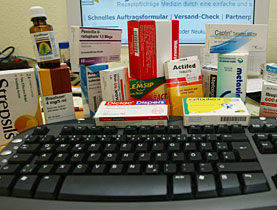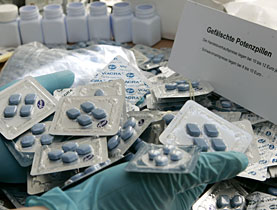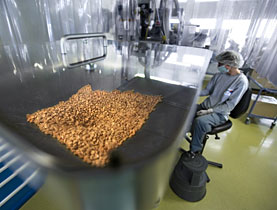Counterfeit drugs on the rise, authorities warn

The importation of counterfeit, untested medicines bought largely online is growing rapidly in Switzerland, and customs agents alone can't stop it.
The medical supervisory agency, Swissmedic, said on Wednesday that educating consumers on the health risks of grey-market medicines is the only way to battle the problem.
The agency is joining forces with pharmaceutical groups pharmaSuisse and Interpharma to launch a national awareness campaign next week.
“Some of these products may seem cheaper but when you realise they don’t have the ingredients in them that the package says they do, the price is too high,” said Karoline Mathys, head of Swissmedic’s marketing monitoring division.
“You pay with your health. Don’t buy them,” she told swissinfo.
People who have bought medicines online are encouraged to take them to one of 520 participating pharmacies on Stop Piracy Day – October 25 – to find out if they are safe.
“Pharmacies are not the police,” said Dominique Jordan, president of pharmaSuisse.
“There is no risk in bringing them in even if they are illegal. No one will be fined.” Nor will the medicines be confiscated, he said.
Buyer beware
Studies by the World Health Organisation show that nearly one out of two medicines ordered online could be counterfeit. Medical shipments from India and Thailand for “shame drugs” – such as those for erectile dysfunction and weight loss – are particularly suspicious.
During a two-day operation in mid-June at a post sorting station in Zurich, customs officers intercepted every package from those countries. Of the 673 packages received, 145 contained medicines.
Nearly all of those medicines – 95 per cent – contained synthetic substances and almost half were for erectile dysfunction. None included proper information for the patients.
Scientists at Swissmedic’s medical control laboratory then analysed 44 of the Viagra knockoff brands. The chemical compositions included banned substances, potentially dangerous levels of active ingredients or no active ingredients at all.
“Counterfeits are getting harder to identify because dealers are getting better at packaging them to look like the real thing,” Jordan said. “It can be hard for people to tell.”
Tip of the iceberg
Buying prescription drugs by mail or online without a doctor’s approval is not generally permitted in Switzerland, but cantonal authorities can authorise it, under certain conditions.
In 2006 Swiss customs agents recorded 271 cases of medicines imported illegally. That jumped to 470 cases for the first nine months of 2008.
“If we had more personnel we could implement more checks and certainly intercept a larger number of suspicious shipments,” Daniel Wagner of the Federal Customs Office said in a statement.
Mathys estimates the actual number of illegal medicine shipments entering Switzerland by mail each year is far more.
“That’s just the tip of the iceberg,” said Mathys, who pegs the actual number of illegal shipments at closer to 50,000 a year.
“There is so much advertising that it’s not possible for customs to control it. Everyday you look in your Outlook there are ads for these drugs.”
swissinfo, Tim Neville
The illegally imported drugs seized by customs are mainly the following:
Erectile dysfunction tablets
Muscle-building products
Dieting products
Skin lightening preparations
The sale of counterfeit drugs online is expected to grow into a $75 billion (SFr84.92) business by 2010. That’s a jump of nearly 90 per cent since 2005.
Officials do not suspect counterfeit drugs are being made in Switzerland but that the country serves as a transit point.
Often a counterfeit drug may appear to come from a European country when in fact the online operation may be based in Africa and the labs in Asia. Most believe criminal organisations are behind the sales.
Swissmedic scientists analysed 25 different brands of medicines for erectile dysfunction shipped from India and Thailand.
They found seven batches had ingredients that didn’t match the packaging.
Five contained substances banned worldwide with no scientific documentation on their effects.
Sixteen had too little active ingredient.
Two batches had nearly twice the allowed limit of other active ingredients.
And 27 were very poor counterfeits.
All of them were illegal imports.
Swissmedic works on an international level to fight against the trade of illegal medicines through information campaigns and lobbying efforts. The group also takes legal action against companies that break the law on medicine.
PharmaSuisse is an association that represents the interests of pharmacies in Switzerland. Pharmacies sell more than 5,000 types of medicines and therapy products through workers who are trained in how to avoid counterfeit medicines.
Interpharma is a Basel-based alliance of Swiss pharmaceutical research firms founded in 1933. It works closely with all aspects of the health industry and communicates to the public matters that concern the pharmaceutical industry, biomedical research and health.

In compliance with the JTI standards
More: SWI swissinfo.ch certified by the Journalism Trust Initiative


You can find an overview of ongoing debates with our journalists here. Please join us!
If you want to start a conversation about a topic raised in this article or want to report factual errors, email us at english@swissinfo.ch.